TL'DR - This blog is about my thoughts and introspection over the recently released paper titled Decentralized Society: Finding Web3's Soul, authored by E. Glen Weyl, Puja Ohlhaver and Vitalik Buterin. This paper is extremely dense and covers many topics, focusing on the concepts of Soulbound Tokens (SBTs) and Decentralized Society (DeSoc). In this blog I highlight some of my thoughts pertaining to this paper, including some functions these DeSoc networks could provide, and how the implementation of such bottom-up governance ecosystems could emerge.
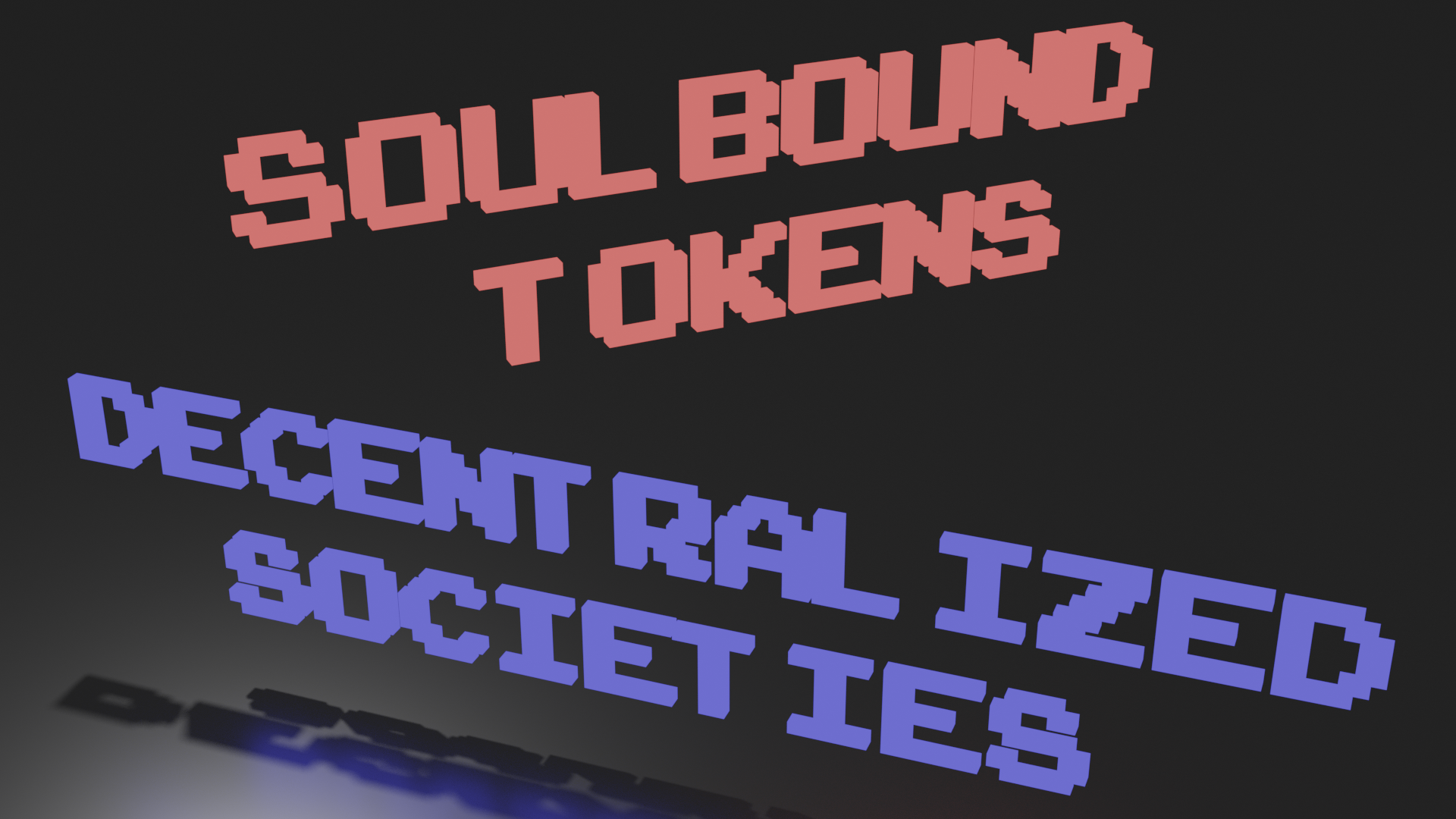
Soulbound Tokens & Decentralized Societies
So what is a Soulbound token (SBT)? A simple question without a simple answer. An internet search leads to many different websites offering many different definitions. How are SBTs interrelated to Decentralized Societies (DeSoc)? This blog is my attempt at answering these questions.
There is a substantial amount of information to take in from the published paper Decentralized Society: Finding Web3's Soul, recently authored by E. Glen Weyl, Puja Ohlhaver and Vitalik Buterin. The paper looks deeply at the concept of a Decentralized Society and how wallets can interact with it using identifying Soulbound Tokens. Going into this paper, I had many misconceptions about what I was about to read. The material is extremely dense, but well worth the read for any futurist / technologist interested in a possible future governed by ground up decentralized social governance.
Strap in ladies and gentlemen, we are about to get really esoteric.
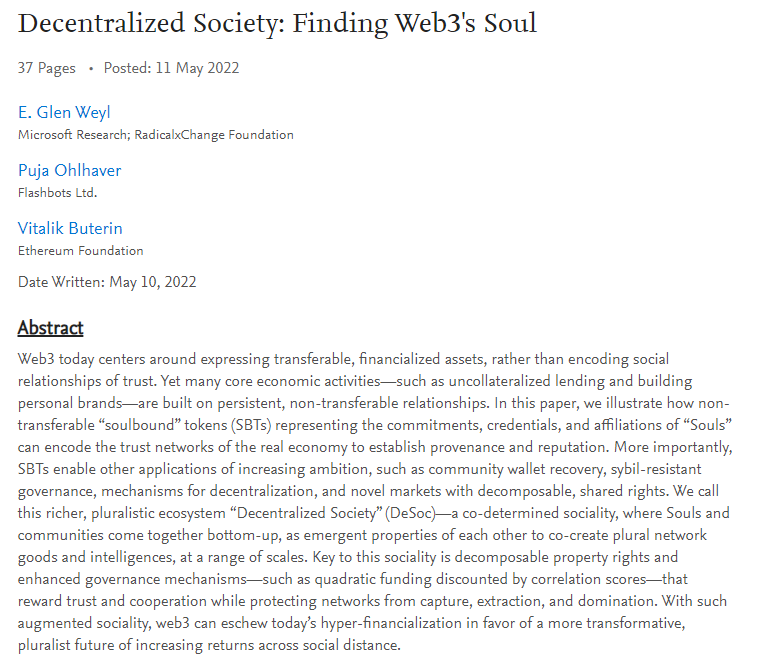
This abstract is incredible dense.
To make any sense of the proposed concepts, it is important to read the abstract, even if it is hard to comprehend initially. One could easily read this and think its nothing but buzzword soup and crypto jargon. That's what I thought until I read the paper (three times over now) and realized the difficulty of reducing the complexity of the topic down to a single page abstract. I'm a little surprised, actually, that the abstract wasn't even more convoluted to be honest.
I'd like to simplify and try to break the paper down by connecting the dots between the concepts, as well as shine clarity on some of the more difficult-to-grasp parts. But before breaking down the common misconceptions facing the article, it might be a good idea to explain exactly:
Why do we even need or want Decentralized Societies and Identification SBTs in the first place?
Fantastic question. Expressed within the paper is the idea of using Soulbound Tokens as a way of socially identifying a cryptocurrency wallet using multiple, ground up governance structures leveraging interpersonal connections. In a nutshell, think about utilizing multiple social networks to form a bottom-up distribution of decentralized social validation. Imagine, having a digital wallet that is validated and identified as being yours through a conglomeration of your social digital networks coming together and issuing immutable, immovable* tokens to the wallet. Soulbound Tokens (SBTs) are tokens that act as identification ownership for a particular wallet. Decentralized Society (DeSoc) is the issuance and governance of SBTs.
Forms of identification have many practical uses, from taking on loans to verification of education, project completions or employment status. The paper stresses utilizing bottom-up distributed, decentralized societies called DeSoc. The question "Why DeSoc?" is essentially the same question as "Why is a digital identity needed, and whats the best way to keep governance structures as bottom-up as possible?" What are the emergent properties of a Decentralized Society of verifiable, immutable digital identities, and how can such a society remain truly decentralized and independant of a top-down governance hierarchy structure? In other words, how can Decentralized Societies remain free of top-down centralized governance, such as an ID involuntarily issued to you by a government, like a social security number?
I have unknowingly written about proto-DeSoc conceptually well before this paper was released. My previous blog entries Hackerspace Coin and very specifically my blog over DAOs and Non-Fungible Educational Ecosystems do well to really highlight usecases for SBTs and DeSoc, even though those terms or this paper were not written at the time I published them. It is important to stress that this paper is still purely conceptual as in these theoretical Decentralized Societies do not exist yet. In fact, the paper poses an interesting dilemma: What comes first: SBTs or community recovery? (pg27). As far as I'm aware, nothing written within this paper has been firmly implemented in any concrete, substantial way.
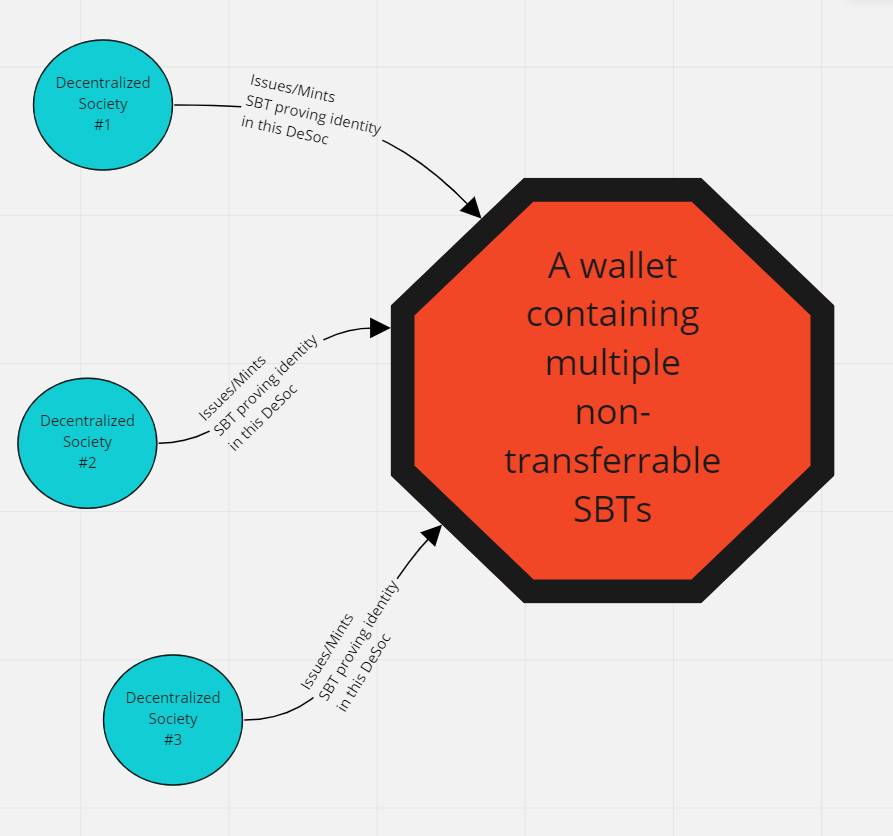
Making sense of SBTs and DeSoc
The easiest (and misleading) definition of a Soulbound Token that is being promulgated across the internet is a token which can not move out of its wallet. This definition is incredibly watered down to the point it doesn't define the concept at all, even by the papers very own definition standards.
Here is what many websites are claiming is a Soulbound Token:
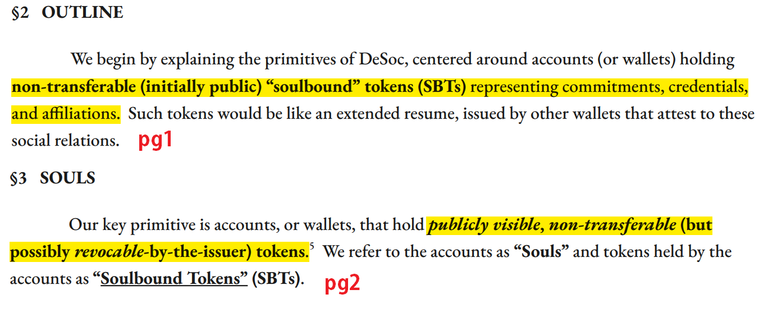
Dig a little deeper into the paper, however, and you'll find this:

This paper may seem to be entirely contradictory on it's own definitions. Why?
The simple answer is it is still entirely conceptual. There are no current functional DeSoc systems issuing SBTs to wallets, because they haven't been created yet. The point of this paper was to propose the idea of Decentralized Societies, not to disclose new technology, systems or projects in the works.
The paper makes it very clear that not only is this idea new and these systems entirely fledgling, but there should not be a one-stop solution to SBT issuance and governance. The paper goes into great detail expressing this.
- page 4: An ecosystem of SBTs could unlock a censorship-resistant, bottom-up alternative to top-down commercial and “social” credit systems. (DeSoc)
- page 5: A more robust solution is to tie Soul recovery to a Soul’s memberships across communities, not curating but instead drawing on a maximally broad set of real-time relationships for security.
- page 6: By embedding security in sociality, a Soul can always regenerate their keys through community recovery, which deters Soul theft...
- page 17: “Decentralized Society (DeSoc)”: a co-determined sociality, where Souls and Communities convene bottom-up, as emergent properties of each other to produce plural network goods across different scales.
- page 20: DeSoc, in contrast, is stochastic social pluralism—a network of individuals and communities that come together, as emergent properties of each other, co-determining their own future.
- page 27: On the one hand, SBTs are not transferable. On the other hand, today's mix of wallets may not be the final home for SBTs because they lack community recovery mechanisms. In order for community recovery wallets to work, they need a rich variety of SBTs across discrete communities to be secure. What comes first: SBTs or community recovery?
These different highlighted details all point towards the authors envisioning DeSoc as being bottom up governance, a distribution of several social governances with their own hierarchies and standards. There are notes about the potential for this technology to become dystopic (pg18), with the authors making earnest attempts to strenghten their ideas through steelmanning the arguments.
There are other considerations and incorrect assumptions I had before reading the paper:
- The systems envision wallets numberous multiple SBTs, there is no limit to how many SBTs one wallet can hold.
- SBTs are not relegated to humans, entities can also acquire SBTs as forms of identification
- SBTs ideally are not transferrable, however the paper notes that this isn't absolute, nor should it be. Some SBTs could start non-transferrable and later switch, or vice versa.
Below is a graphic I made to attempt to illustrate a network of DeSoc and SBT bonded wallets. This is my own interpretation and may not be fully accurate to the finalized implementation of DeSoc/SBTs. (I made the SBTs into the octagon shape to symbolize the illiquid nature of the tokens.)
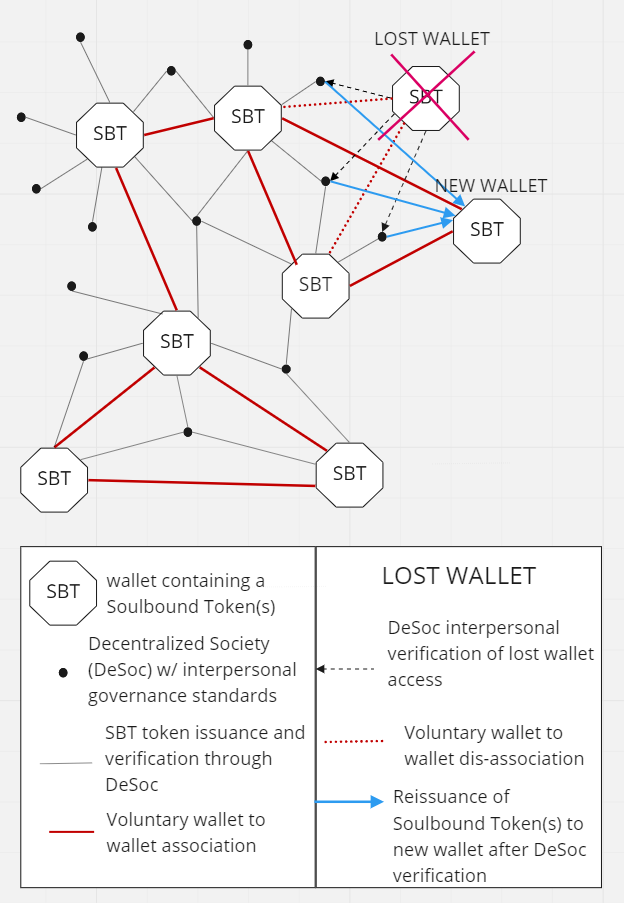
The above chart is a semi-jumbled mess of a graphic, my apologies for that. It is my attempt to explain how DeSoc is envisioned to work. Following the chart, the octagon SBT symbols represent individual wallets which hold one or more identification SBTs. The black dots represent different Decentralized Societies, with the thin black lines representing the issuance and verification of SBT wallet identification. The solid red lines represent voluntary SBT wallet to SBT wallet association, using the contained SBTs as a form of identification verification.
In the event of a lost/compromised wallet, the person/entity represented by a SBT contacts/notifies their decentralized societies (interpersonal governance) represented by the dotted black line. Once interpersonal governance meets the associated criteria from the various associated DeSoc(s) (in other words, once the entity proves they are who they are to the different DeSoc(s) they were engaged with) a new SBT is issued to a non-compromised wallet, represented by the blue lines. The old SBT could just forever remain on the lost/compromised wallet, or could possibly be revoked. On pg28 the paper states: Revocable, transferable tokens are a kind of proto-SBT—serving supportive, placental functions before Soul birth. Other SBT wallets could then re-associated themselves with the new, correctly identified wallet.
In summary, I know this blogpost will seem cryptic.
I mean, we are talking about cryptocurrency (haha) but honestly, this is a pretty advanced topic to even begin to discuss. I feel if NFTs are commonly misunderstood as much as they are, then SBTs are going to be monumentally much more difficult to discuss and process. There is a pretty extreme learning curve on this topic, even more so since it is merely just that, an idea, a topic. There is nothing concrete with these ideas yet. All that aside, I would say that the HIVE blockchain is a fundamentally fantastic place to begin to experiment with such DeSoc systems.
SBTs and Decentralized Societies do have plenty of possible downsides and dystopic potential, and could become a real threat to human liberty and freedom. Or they could truly assist us and help free and liberate us from top down structures of edicted identification and control. I suppose time will tell.
Amphlux is a cryptomusician, technologest, futurist and cryptophile living in the Midwest, USA. I warmly welcome and encourage any and all questions and comments below and will do my best to reply to them. Thank you for reading.

| # | Track | Length | Genre |
|---|---|---|---|
| 1 | Cryptonomeconomics | 3:11 | Crypto-Groove |
| 2 | Flyover Soul | 5:57 | Flytuned Chipstep |
| 3 | Minimal | 3:28 | Dreamscape |
| 4 | In The Minds Of Those Around You | 4:54 | Electro Breakline |
| 5 | Mercenary | 6:22 | Aggrostep |
| 6 | Quadtone | 2:44 | Synth Quartet |
| 7 | Moot Trio | 4:40 | Post Industrial |
| 8 | Endgame | 4:44 | VGM Bosstime |
| 9 | Crisis | 5:22 | Arppegiod Chipestra |
Posted Using LeoFinance Beta